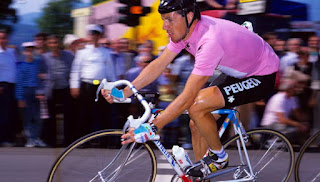A few weeks ago, I wrote about how the coronavirus might keep you from getting the new bike you want.
The other day, I wondered whether quarantines or containment zones might keep us from doing some of our regular rides--or force us to re-route them.
Now I've learned that bike races, just like other sporting events can be affected. The Sea Otter Classic, which had been scheduled for next month in Monterey, California, has been rescheduled for 1-4 October.
Of course I understand organizers' reasons for re-scheduling the event. And, given that Italy is basically under lockdown because of its virus outbreak, it's no surprise that this year's Strade Bianche and Milano-San Remo one-day classic races have been postponed. So, I wonder whether upcoming "classics" further north in Europe, such as Gent-Wevelgem and Paris-Roubaix will also be affected, as the scope of the outbreak is spreading and France has banned gatherings of 1000 or more people.
If those races are postponed or cancelled, what will happen to the Giro d'Italia, which runs in May, or the Tour de France or Vuelta a Espana if the epidemic engulfs those countries.
David Lappartient, the president of the Union de Cyclisme Internationale, says that canceling the Giro or the Tour would be a "disaster" for cycling. He seemed more optimistic about the prospects for the Tour, not only because he's French, but also because the worst of the crisis may pass before the race starts.
The Tour's grand depart is scheduled for 27 July--a week earlier than normal--because of the Tokyo Olympics, which themselves may be postponed.
Perhaps the Sea Otter won't be the only major cycling event in October after all. Or, to put it another way, the World Series might not be the only Fall Classic this year!
The other day, I wondered whether quarantines or containment zones might keep us from doing some of our regular rides--or force us to re-route them.
Now I've learned that bike races, just like other sporting events can be affected. The Sea Otter Classic, which had been scheduled for next month in Monterey, California, has been rescheduled for 1-4 October.
Of course I understand organizers' reasons for re-scheduling the event. And, given that Italy is basically under lockdown because of its virus outbreak, it's no surprise that this year's Strade Bianche and Milano-San Remo one-day classic races have been postponed. So, I wonder whether upcoming "classics" further north in Europe, such as Gent-Wevelgem and Paris-Roubaix will also be affected, as the scope of the outbreak is spreading and France has banned gatherings of 1000 or more people.
If those races are postponed or cancelled, what will happen to the Giro d'Italia, which runs in May, or the Tour de France or Vuelta a Espana if the epidemic engulfs those countries.
David Lappartient, the president of the Union de Cyclisme Internationale, says that canceling the Giro or the Tour would be a "disaster" for cycling. He seemed more optimistic about the prospects for the Tour, not only because he's French, but also because the worst of the crisis may pass before the race starts.
The Tour's grand depart is scheduled for 27 July--a week earlier than normal--because of the Tokyo Olympics, which themselves may be postponed.
Perhaps the Sea Otter won't be the only major cycling event in October after all. Or, to put it another way, the World Series might not be the only Fall Classic this year!








